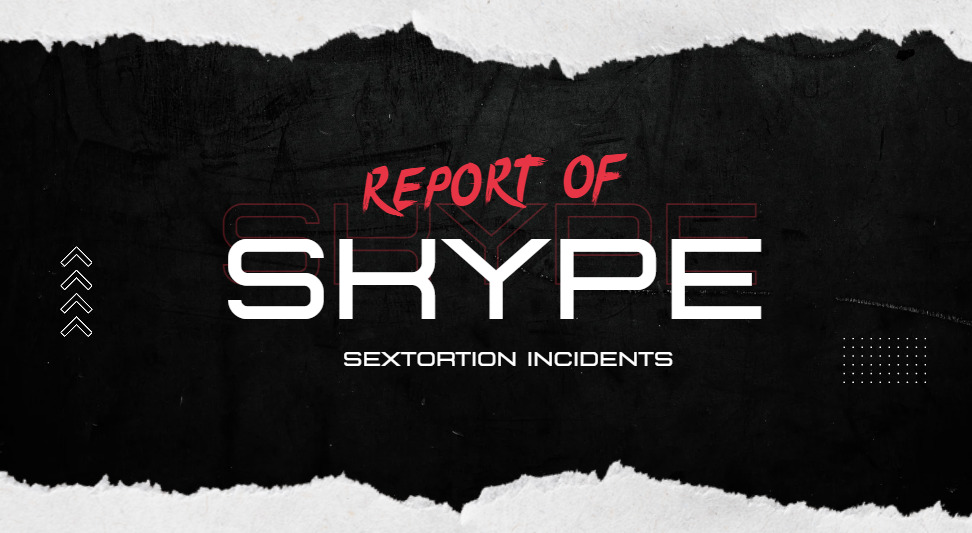
skype sextortion
Skype Sextortion
Skype, a popular communication platform that enables people to connect across the globe, has unfortunately become a tool for criminals to carry out a disturbing form of extortion known as “Skype sextortion.” This malicious activity involves scammers coercing individuals into performing explicit acts on video calls and then threatening to release the recordings unless a ransom is paid. In this article, we will delve into the tactics employed by these criminals, discuss ways to protect yourself from falling victim to such scams, and provide guidance on reporting incidents to help combat this form of cybercrime.
Understanding Skype Sextortion:
Skype sextortion schemes typically begin with scammers initiating contact through the platform, often targeting individuals who appear vulnerable or susceptible to manipulation. They engage in conversations and build rapport to gain the victim’s trust before gradually escalating the interactions to explicit content. These criminals record the video calls without the victim’s knowledge or consent and subsequently use the recorded material as leverage for extortion.
Once the explicit material is obtained, the scammers issue threats to expose the recordings to the victim’s family, friends, or colleagues unless a ransom is paid. This coercive tactic preys on the victim’s fear of reputational damage and humiliation, often leading to emotional distress and even compliance with the demands.
Protecting Yourself from Skype Sextortion:
While the threat of Skype sextortion is alarming, individuals can take several precautionary measures to safeguard themselves from falling victim to such scams. First and foremost, it is vital to exercise caution when engaging in online conversations, particularly with unfamiliar individuals. Avoid sharing personal information or engaging in explicit conversations or activities on video calls with strangers.
Additionally, be wary of unsolicited requests to connect on Skype, especially from individuals you do not know personally. Keep your Skype privacy settings updated, allowing only trusted contacts to reach out to you. Regularly review and manage your contacts list to ensure that only genuine connections are retained.

Report Sextortion Incidents
Report Sextortion Incidents:
Reporting incidents of Skype sextortion is crucial in the fight against this cybercrime. By reporting such incidents, you contribute to the gathering of information that can help law enforcement agencies track down and apprehend the criminals involved.
To report a sextortion incident on Skype, follow these steps:
- Document the evidence: Preserve any communication, screenshots, or emails exchanged with the scammer. This evidence will be valuable for authorities investigating the case.
- Contact your local law enforcement: Report the incident to your local police or cybercrime unit. Provide them with all relevant information, including the scammer’s Skype username, the content of the communication, and any other details that might aid in the investigation.
- Report to Skype: Inform Skype about the incident by visiting their official website and accessing their support or help section. Use their designated reporting mechanisms to provide details of the scam, including the scammer’s username and any relevant evidence you have collected.
- Notify your social media platforms: If you connected with the scammer through other social media platforms, report the incident to those platforms as well. This helps to ensure that appropriate action can be taken against the scammer’s accounts.
Conclusion:
Skype sextortion is a distressing form of cybercrime that preys on the vulnerability and fear of victims. By staying vigilant, adhering to safety practices, and promptly reporting incidents to the relevant authorities and platforms, we can work together to combat this menace. Remember, the key to protection lies in awareness, caution, and responsible online behavior. Stay safe and encourage others to do the same, as we strive to create a secure digital environment for all.
The digital landscape is filled with hidden dangers. “Skype Sextortion” and “Skype Blackmail” are real threats that affect thousands daily. Cybercriminals are getting smarter, but so can you.
Contact us and don’t be a victim, be a protector of your own privacy. The key to a safer online experience starts with you.



